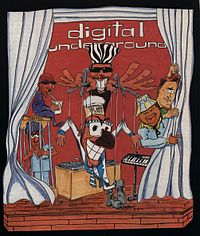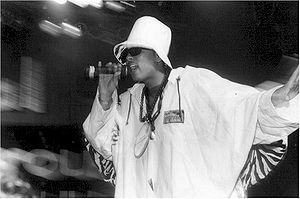- Digital Underground
-
Digital Underground Also known as D.U.
Digital
Tha Underground
D-FlowOrigin Oakland, California Genres Hip hop, alternative hip hop, west coast hip hop, funk Years active 1987–2008 Labels Tommy Boy/Warner Bros. Records
Critique/BMG Records
Jake/Interscope/Universal RecordsWebsite http://www.shockg.com Past members Greg "Shock G" Jacobs
Money-B
Jeremy "DJ-JZ" Jackson
DJ Nu-Stylez
Cleetis "Clee" Mack
2Fly Eli
DJ Fuze
Chopmaster J
Kent Racker
Nzazi Malonga
Schmoovy-Schmoov
Ramone "Pee Wee" Gooden
Saafir
Tupac Shakur (deceased)
Esinchill
BINC
Young Mass
Kenny K (deceased)
Metaphysical
Numskull
Dialect Lector
Eric "Kenya Gruve" Baker
Boni Boyer (deceased)
Mystic
DOT
Roniece Levias
Big Money Odis
Juan Carlos
Kim MorganDigital Underground was an alternative hip hop group from Oakland, California. It could have been considered a music "family" rather than a group, as its personnel changed and rotated with each album and tour.[1]
Digital Underground's leader was Greg "Shock G" Jacobs (also known as Humpty Hump); Shock G formed the group in 1987 with Jimi "Chopmaster J" Dright of Berkeley, California, and Tampa hip-hop radio deejay Kenneth "Kenny-K" Waters.[2]
Heavily influenced by the various funk bands of the 1970s, Digital Underground sampled such music frequently, which became a defining element of West Coast rap. As "Rackadelic", Jacobs designed album covers and cartoon-laced liner notes, in homage to Parliament-Funkadelic album designs. Digital Underground is also notable for launching the career of member Tupac Shakur, as well as spinning off side projects and solo acts including Raw Fusion, Saafir, and female singer Mystic.[3]
Following the release of their "Doowutchyalike" single and video in the summer of 1989, and the band's gained popularity by their song "The Humpty Dance" in 1990, Digital Underground toured nearly every year up until 2008; this consisted of thousands[quantify] of live shows in Europe, Japan, Canada, Australia, and the U.S. While the group's origins lay mostly in Oakland and Berkeley, California, various characters and voices from around the U.S. appeared on the band's albums, while Shock G and Money-B were the only individuals to appear on every album. Other recurring key contributors were David "DJ Fuze" Elliot, and deejay/producer Jeremy "J-Beats" Jackson, who both assisted Jacobs in developing the sound.[3]
The group appeared in and donated music to the 1991 film Nothing but Trouble, which was directed by Dan Aykroyd.
After approximately twenty years of touring, Shock G announced that the group would officially disband in 2008. Shortly after that announcement was made, the group also confirmed that their May 2008 album ..Cuz A d.u. Party Don't Stop! would be their last studio effort.[4]
Contents
History
Formation
Jacobs spent most of his youth in Tampa, Florida and New York City. Founded in 1987, the group's image was originally more militant, and was intended to be a tribute to social activists The Black Panthers. However, when Public Enemy became a prominent band, Jacobs chose to take the image in a more whimsical direction.
Sex Packets
Sex Packets, the group's debut album, was released in the spring of 1990 following the success of its two leadoff singles. First came "Doowutchyalike," a moderate club hit, followed by the more successful song "The Humpty Dance", a humorous dance number that reached #11 on the pop charts[specify], #7 on the R&B charts, and #1 on the Billboard Rap Singles chart. It was rapped by Shock G's alter ego Humpty Hump, and featured a drumtrack with over 50 confirmed usages in other songs. Sex Packets features P-Funk samples, jazz-influenced interludes, and a combination of samples and live instrumentation, earning it positive reviews and platinum sales.
This is an EP Release
This is an EP Release is the RIAA Gold certified second Digital Underground release, from which two songs, "Tie the Knot" and "Same Song" were featured in the film Nothing But Trouble starring Dan Aykroyd, Chevy Chase, Demi Moore, and John Candy. "Tie The Knot," features jazzy piano tracks and a comedic interpretation of "Bridal Chorus". "Same Song" has an organ solo and improvised organ bits throughout the song, making it one of hip hop's first singles to successfully integrate live instrumentation with music samples. Tupac Shakur made his debut on the latter song and portrayed an African king in the video. Tupac also can be heard joking around on the remixed version of "The Way We Swing" as a background vocalist, adding humorous ad-libs between the verses.
Sons of the P
The group's third album featured two singles, "No Nose Job" and "Kiss You Back", the latter of which featured multi-layered choruses and background vocals sung by Boni Boyer, who briefly worked with Digital Underground shortly after her stint with Prince's Sign of the Times/Love Sexy band.[citation needed] Despite the fact that a choir of singers were portrayed in the video, the actual studio singing was exclusively Boni on all tracks, excluding the male voices.[5] It has been mistakenly reported that "Kiss You Back" was co-written and co-performed by George Clinton,[6] but his name appears in the writers credit due to a sample of "(Not Just) Knee Deep" by Funkadelic being used. He did, however, actively participate in the writing and recording of the title track "Sons of the P", which he also contributed vocals to, and which marked one of the earliest studio guest appearances by Clinton on a Hip Hop release,[7] which is preceded only by Kurtis Blow's "Magilla Gorilla" released in 1986.[8] Both the album and the "Kiss You Back" single were each certified Gold by the RIAA.
The Body-Hat Syndrome
With the leading single "The Return of the Crazy One," and its accompanying X-rated video, which was reworked for public consumption, gaining positive feedback, the rest of The Body-Hat Syndrome unfurled to less than outstanding crossover commercial acclaim. The album's second single, an anti-racism cultural awareness politico called "Wussup Wit the Luv," featured a solo from Funkadelic guitarist Michael Hampton, as well as a verse and video appearance from Tupac Shakur. This would be the last time Tupac appeared on any Digital Underground release, while lead rappers Saafir and Clee were added to the band's line-up. This album also features "The Humpty Dance Awards", the group's humorous shout-out to the artists who sampled the Humpty Dance prior to 1993.
Future Rhythm
Future Rhythm, the group's fifth album, would be the band's first independent release, and it spawned two songs that were featured in the Wayans brothers' film Don't Be a Menace to South Central While Drinking Your Juice in the Hood. The songs are "Food Fight", which featured Del tha Funkee Homosapien, and "We Got More" with Luniz. The latter is featured twice on the soundtrack: once as a full song, and once as an intro edited to the beginning of "Winter Wars" by Ghostface Killa.[citation needed] The album also contains an early performance from rapper Sly Boogy, while he was still a member of the Black Spooks, who appeared on the song "Fool Get a Clue."[9]
Who Got the Gravy?
In 1998, eight years after the group's first release, Digital Underground released Who Got the Gravy?, which reached #91 on the Top 200 R&B/Hip-Hop Albums charts. The album intentionally featured several East Coast rappers at a time when the East vs. West rivalry was active, in an attempt to both ignore and ridicule it. The guests included New York City natives Big Pun, Biz Markie, and KRS One, and introduced Whuteva and Stylez, while also introducing west coast bay area newcomers Esinchill and female emcee Mystic.
..Cuz A D.U. Party Don't Stop!
Digital Underground's final studio album, ..Cuz A D.U. Party Don't Stop!!, was released on May 20, 2008, although a substantial portion of it was recorded at a live show from 2005. Shortly before its release, the group embarked on an indefinite hiatus. Money-B has stated that Shock G expressed interest in writing a book and exploring music that the latter would deem unfit for the Digital Underground name.[10]
On May 18, 2010, The Greenlight EP was released, which features previously unreleased Digital Underground tracks.[11]
Discography
Albums
- Sex Packets (1990)
- This Is An EP Release (1991)
- Sons Of The P (1991)
- The Body-Hat Syndrome (1993)
- Future Rhythm (1996)
- Who Got The Gravy? (1998)
- The Lost Files (1999)
- ..Cuz A D.U. Party Don't Stop!! (2008)
- The Greenlight EP (2010)
Soundtracks
- Nothing But Trouble (1991)
- Don't Be a Menace to South Central While Drinking Your Juice in the Hood (1996)
- Tupac: Resurrection (2003)
Compilations
- Yo! Rap Hits (1991)
- Oakland Soul: The Bay Area Soundtrack (1997)
- No Nose Job: The Legend of Digital Underground (2002)
- Outrageous Rap (2002)
- Playwutchyalike: The Best of Digital Underground (2003)
- Rhino Hi-Five: Digital Underground (2005)
- Songs You Know: Ol' Skool Hip Hop (2007)
- Westside Bugg Presents... The Best of The West (2008)
Videos
- "Doowutchyalike" (1989)
- "The Humpty Dance" (1990)
- "Doowutchyalike" (video remix) (1990)
- "Same Song" (1991)
- "Kiss You Back" (1991)
- "No Nose Job" (1992)
- "Return of the Crazy One" (1993)
- "Wussup Wit the Luv" (1994)
- "Oregano Flow" (1996)
- "Walk Real Kool" (1996)
- "Wind Me Up" (1998)
DVDs
- Digital Underground: Raw and Uncut (2004)
- Thug Angel: The Life of an Outlaw (2000)
- Tupac: Resurrection (2003)
- One Nation Under a Groove (2005)
References
- ^ "Digital Underground Biography". Musicianguide.com. http://www.musicianguide.com/biographies/1608000430/Digital-Underground.html. Retrieved 2010-08-11.
- ^ "Kenny K - Tampa Hip-Hop dot Com v2.0". Tampahiphop.com. http://www.tampahiphop.com/kenny.php. Retrieved 2010-08-11.
- ^ a b "Digital Underground | View the Music Artists Biography Online". VH1.com. 1963-08-25. http://www.vh1.com/artists/az/digital_underground/bio.jhtml. Retrieved 2010-08-11.
- ^ Pop Matters; We Don't Die, We Multiply
- ^ "Boni Boyer - Bio, CDs and Vinyl at Discogs". Discogs.com. http://www.discogs.com/artist/Boni+Boyer. Retrieved 2010-08-11.
- ^ "Digital Underground: Information from". Answers.com. http://www.answers.com/topic/digital-underground. Retrieved 2010-08-11.
- ^ Huff, Quentin B.. "We Don't Die, We Multiply: Heartbeat Props < PopMatters". Popmatters.com. http://www.popmatters.com/pm/column/we-dont-die-we-multiply-heartbeat-props. Retrieved 2010-08-11.
- ^ "Artist Info: Kurtis Blow". Tunegenie.com. 1959-08-09. http://www.tunegenie.com/bio/MN0000116388/kurtis-blow/. Retrieved 2010-08-11.
- ^ "Black Spooks - Bio, CDs and Vinyl at Discogs". Discogs.com. http://www.discogs.com/artist/Black+Spooks. Retrieved 2010-08-11.
- ^ Interview with Digital Underground's Money-B blogcritics.org. 2009-07-31. Retrieved on 2010-11-08.
- ^ Digital Underground – The Greenlight EP features previously unreleased tracks, and releases May 18th mvremix.com. 2010-04-23. Retrieved on 2011-01-16.
External links
Categories:- Tupac Shakur
- Musical groups from Oakland, California
- Musical groups established in 1987
- Musical groups disestablished in 2008
- West Coast hip hop groups
- Tommy Boy Records artists
Wikimedia Foundation. 2010.


